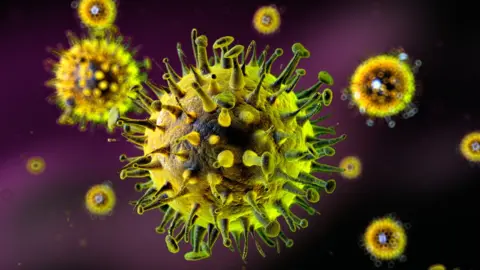Flu vaccine: NHS patients wanted to test 'universal' jab
 Getty Images
Getty ImagesResearchers are seeking about 500 NHS patients to try out a new "universal" vaccine against seasonal flu.
The experimental vaccine works differently from the one currently available, which has to be remade each year based on a "best guess" of what type of flu is likely to be about.
The new jab targets part of the virus that does not change each year.
This means the vaccine should work against human, bird and swine flu, say the team at University of Oxford.
It will offer people better protection, they believe.
Extra protection
Immunisation is the best defence we have against flu but it is not always effective.
Last winter's vaccine cut the risk of flu in adults under the age of 65 by about 40%, but barely worked in people over 65, despite being a good match for the type of flu in circulation.
As people age, their immune systems are often weaker and their bodies may not respond as well to a vaccine as younger people's bodies.
Prof Sarah Gilbert and colleagues believe that using their vaccine alongside the current one could help.
It is the world's first widespread human testing of such a vaccine, according to the National Institute for Health Research, which is supporting the project.
 Getty Images
Getty ImagesPatients aged 65 or older and living in Berkshire and Oxfordshire will be invited to take part in the trial.
Half of the 500 volunteers will receive the usual seasonal flu jab and a placebo or dummy jab, while the other half with get the regular vaccine plus the new experimental one.
The new vaccine uses a novel way to get the body to ward off flu.
Flu viruses look a bit like a ball covered in pins. Current flu jabs work by getting the body's immune system to recognise and attack the pin heads or surface proteins of the virus.
But these surface proteins can change, meaning the vaccine must change too.
The experimental vaccine instead encourages the body to make other immune system weapons, called T cells, against unchanging core proteins housed within the "ball" part of the virus.
It should fight multiple strains of influenza and will not need to be redesigned each year, unlike the current one used by the NHS.
Bad flu season
Prof Gilbert, co-founder of Vaccitech, a spin-out company from University of Oxford's Jenner Institute that is part-funding the work, told the BBC: "We expect that the protection from the new vaccine will last longer than a year, but we will need to test that with more clinical trials in the future.
"It is possible that, in future, vaccinations against flu might be given at longer intervals - maybe every five years instead of every year. But first we have to test protection in the first flu season following vaccination."

Free NHS flu jabs are available for:
- People over 65
- Pregnant women
- Children and adults with chronic health conditions, such as asthma, or weakened immune systems
- Residents of long-stay care home or other facilities
- Children aged two and three on 31 August 2017, plus reception-age schoolchildren, as well as children in school years one, two, three and four (children eligible and between the ages of two and 17 will usually be offered a flu vaccine nasal spray rather than a jab)
- Carers
Source: NHS Choices

She said the current trial will take two years to complete. If further studies go well the vaccine could then be licensed for wider use.
The NHS is braced for a bad flu season this winter, following the worst outbreak in many years in Australia and New Zealand.
Flu is easily transmitted and even people with mild or no symptoms can infect others.
Follow Michelle on Twitter
